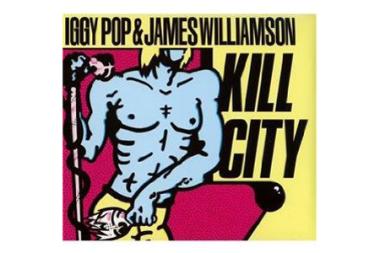Iggy Pop & James Williamson
Kill City
(Alive/Bomp)
Kill City is the great lost Iggy Pop album. Recorded for a tiny label in the desperate post-Stooges days, it was saddled with weedy sound that compromised a superb set. This reissue radically remixes the original tapes and sounds so much better that it’s practically a new album. It strikes the right balance between the music’s raw swagger and its surprising sophistication. The guitars have real bite, the vocals are forceful, and nuances like background vocals and horn lines come sharply into focus. Written with Stooges guitarist James Williamson, Kill City boasts an eclectic range of songs, including a proto-punk rocker, a soul-inflected piece, a pummeling love song and an acoustic ballad. The smeared keyboard textures of “Master Charge” startlingly resemble today’s hypnogogic pop. Even for fans of this little known gem, the reissue should prove a revelation. —Jeff Jackson
*
False Positive
False Positive
(Fanatic)
Like a thousand bands who can sort of play and combine simple, sing-songy melodies with layers of noise, old radio samples, low-fi effects and distorted guitar, this band seems to fancy itself The Flaming Lips. Alas, also like 999 of those bands, they are not The Flaming Lips. While some of False Positive’s experimentation and writing (especially the softer songs) is interesting in a bleak, Roger Waters/Leonard Cohen way, and the project’s main creative force, Justin Mikulka, is obviously a guy who broods on subjects like war, religion and insanity, these positive qualities can’t quite overcome mediocre vocal and instrumental abilities. “Strike Up the Band” is one notable exception; it’s a pretty good song, really, even if it does sound a little like “Dear Mr. Fantasy.” “Teaching Sorrows” is also not bad, and the cover art is bitchin’. —Tom Sturm
*
Broken Records
Let Me Come Home
(4AD)
From humble beginnings as a “series of sketches and song fragments in frontman Jamie Sutherland’s kitchen,” the material on these Edinburgh stars’ sophomore album is full of the same sweeping arrangements that made their 2009 debut so favored by the U.K. press. As a sextet, the band is known for grandiose live shows, but here they struggle to bring their over-the-top sound to CD. Sutherland’s moody baritone appears perpetually stuck in wallowing position, and his occasional falsetto grates more than it heightens. Still, when distorted guitars, violin and piano collide at the beginning of “A Darkness Rises Up,” the group shows it’s capable of crafting tunes worthy of courting by alternative radio. The songs often work despite layers of emotive strings, marching drums, and echo-laden piano. Future explorations of joy instead of misery could prove interesting. —Michael Cimaomo



